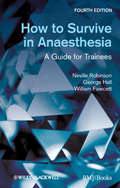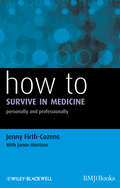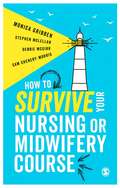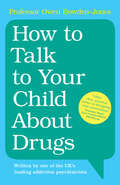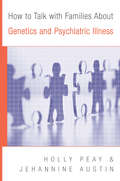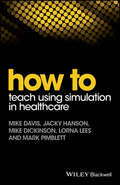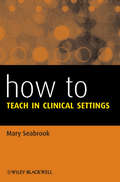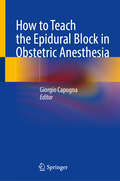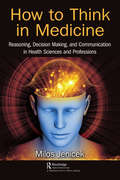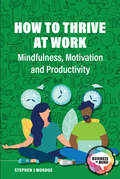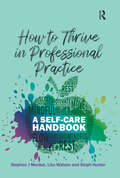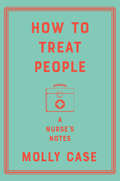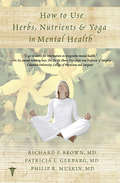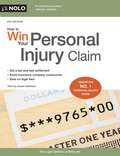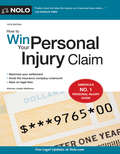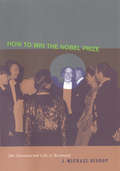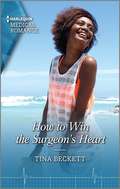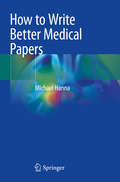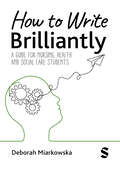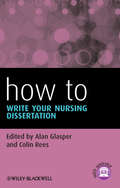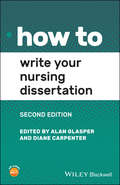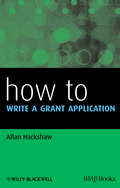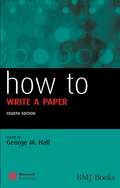- Table View
- List View
How to Survive in Anaesthesia
by Neville Robinson George M. Hall William FawcettAnaesthesia can be daunting for the novice - not least because they often begin working singlehandedly within a few weeks. How to Survive in Anaesthesia is a pocket sized book written by 3 authors who have nearly 90 years experience of anaesthesia between them. It covers basic aspects of airway and fluid management and equipment, followed by common emergencies. Finally it tackles all the common surgical specialties step by step. It is always practical, ever contemporary, frequently amusing. It provides safe and practical advice to not only help novices survive those first few months - but to enjoy them too.How to Survive in Anaesthesia was written to answer the questions that newly qualified anaesthetists need answers to but may be too embarrassed to ask. Through three editions its popularity has gathered momentum across the globe. Now the fourth edition has been revised and updated, responding to changes in practice and new requirements. New features for this edition include:A new introduction on the theatre environmentA new chapter on local anaesthetic toxicity The latest guidelines on intravenous fluids Updated information on airway procedures and equipment Written in an easy, humorous style by leading anaesthetists who have over 90 years' experience between them, this book is the junior anaesthetist's gateway to sound authoritative advice on how to perform anaesthetics in real life. It will inspire confidence in any new doctor starting in the specialty.
How to Survive in Medicine: Personally and Professionally (How To)
by Jenny Firth-CozensMedicine is a career that most people consider to be enviable. Whatever one's criteria for a good job, being a doctor ticks a lot of boxes: doctors are needed, respected, well remunerated and can make a difference between life and death Increasingly, doctors are experiencing stress, depression and anxiety, fuelled by the increasing demands of the health services, and the lack of resources to support them. Focussing on the causes, symptoms and management of psychological problems experienced by doctors at all stages in their careers, this book considers the difficulties and stressors of medicine as a career, linking to studies that look at what interventions are successful in the workplace and offering various solutions. Including: A study based over 20 years of doctors' stress factors Case histories to bring the subject to life Guidance on choosing a specialty, dealing with difficult people, stress and demands 37 A valuable resource both for trainers and doctors alike.
How to Survive your Nursing or Midwifery Course: A Toolkit for Success
by Sam Chenery-Morris Monica Gribben Stephen McLellan Debbie McGirrNursing and midwifery are inspiring and amazing professions – but as your students face the realities of juggling work, study and life, they may now be thinking ‘what did I let myself in for’? This book is designed to help students that are struggling and need a little (or a lot of) guidance. It’s packed with useful information and practical exercises to help them cope with all the major sources of stress for nursing and midwifery students – including: juggling time succeeding in assignments and exams understanding what’s expected in real life and on placements managing finances coping with stress applying for jobs and more Written by authors who have helped countless students from a wide range of backgrounds conquer their problems, this book will be something students can come back to again and again to help them succeed on their journey to becoming a registered nurse or midwife.
How to Survive your Nursing or Midwifery Course: A Toolkit for Success
by Sam Chenery-Morris Monica Gribben Stephen McLellan Debbie McGirrNursing and midwifery are inspiring and amazing professions – but as you face the realities of juggling work, study and life, you may now be thinking ‘what did I let myself in for’? This book is designed to help anyone who is struggling and needs a little (or a lot of) guidance. It’s packed with useful information and practical exercises to help nursing and midwifery students cope with all the major sources of stress – including: juggling time succeeding in assignments and exams understanding what’s expected in real life and on placements managing finances coping with stress applying for jobs and more Written by authors who have helped countless students from a wide range of backgrounds conquer their problems, this book will help you to succeed in your journey to becoming a registered nurse or midwife.
How to Talk to Your Child About Drugs
by Owen Bowden-JonesBroaching the topic of drugs and drug use with your child can feel particularly daunting. With the illegal drug market constantly evolving, it can be difficult to stay up to date with the latest information. How to Talk to Your Child About Drugs is an evidence-based, practical guide from a leading addiction specialist. The book offers clear and accessible guidance for parents on how to have effective conversations with their child about this difficult topic. It provides a summary of both established and newly emerging drugs, how drugs work in the brain, how they cause harm, and why some people are more vulnerable than others to problems, including signs parents should be looking out for. This is a book that all parents will need at some stage. It will help you feel better informed about drugs, more confident in talking to your child, and better equipped to tackle any problems.
How to Talk with Families About Genetics and Psychiatric Illness
by Holly Landrum Peay Jehannine Claire AustinAddressing clients' questions and concerns about the role of genetics in mental illness. As we learn more about how our biology and genes can play into the development of a mental health disorder, patients and their families are increasingly seeking answers to tough questions about common risk factors, the likelihood of recurrence, the need for genetic testing, and implications for future generations. A practical, go-to resource for all mental health clinicians, this guide explains just how to address these questions and concerns in a way that's comprehensible and compassionate. Filled with case studies, sample dialogues, and question-and-answer examples, it is an essential roadmap for practitioners, helping them to demystify a complex issue for their clients and equip them with the accurate, reassuring information they need.
How to Teach Using Simulation in Healthcare
by Mike Davis Jacky Hanson Lorna Lees Mark Pimblett Mike DickinsonHow to Teach Using Simulation in Healthcare provides an ideal introduction and easy-to-use guide to simulation in medical education. Written by a team of experienced medical educators, this practical text – packed full of case examples and tips – is underpinned by the theory of simulation in education, and explores how to integrate simulation into teaching. Key topics include: Use of low, medium and high fidelity equipment Issues of simulation mapping and scenario design Role of human factors Formative and summative assessment New social media and technologies Detailed explorations of some examples of simulation. How to Teach Using Simulation in Healthcare is invaluable reading for all healthcare professionals interested and involved in the origins, theoretical underpinnings, and design implications of the use of simulation in medical education.
How to Teach in Clinical Settings
by Mary SeabrookHow to Teach in Clinical Settings is a practical guide to support all doctors wishing to develop their skills in clinical teaching and supervision.It provides hands on strategies to address common problems such as giving critical feedback effectively and teaching mixed-level groups. It gives guidance on the particular challenges of teaching in clinical settings including the need to manage teaching with service provision, to engage patients, motivate students, and to judge the balance of support and independence appropriate for each trainee.How to Teach in Clinical Settings is invaluable for all doctors involved in teaching and training at any stage of their career. It is also useful and accessible to medical students who increasingly need to consider and develop their own teaching skills as part of their career progression.
How to Teach the Epidural Block in Obstetric Anesthesia
by Giorgio CapognaThis book highlights the distinction between "how to teach" and "how to practice," emphasizing the importance of effective teaching skills in conveying information and skills to others. The authors' extensive experience and research make this book a comprehensive and authoritative guide to effective teaching methods for the challenging task of teaching the epidural technique. Traditionally, teaching this technique has relied on observation and hands-on experience with a tutor. However, the book proposes the use of simulators and other new tools to aid learning and explores methods of assessing learning outcomes. Additionally, the volume editor draws on his 30 years of experience as a clinical teacher and current scientific studies to develop a comprehensive understanding of effective teaching methods. The book also discusses promising new tools, such as virtual reality, metaverse, and eye-tracking-based teaching, which have the potential to revolutionize the way medical professionals learn and practice clinical skills. By exploring these emerging technologies, the book offers a forward-looking perspective on the future of medical education.Overall, this book is a valuable resource for those interested in teaching the epidural technique and for medical educators more broadly. Its consideration of new technologies makes it forward-looking and provides insights into the future of medical education.
How to Think in Medicine: Reasoning, Decision Making, and Communication in Health Sciences and Professions
by Milos JenicekMastery of quality health care and patient safety begins as soon as we open the hospital doors for the first time and start acquiring practical experience. The acquisition of such experience includes much more than the development of sensorimotor skills and basic knowledge of sciences. It relies on effective reason, decision making, and communication shared by all health professionals, including physicians, nurses, dentists, pharmacists, and administrators. How to Think in Medicine, Reasoning, Decision Making, and Communications in Health Sciences is about these essential skills. It describes how physicians and health professionals reason, make decision, and practice medicine. Covering the basic considerations related to clinical and caregiver reasoning, it lays out a roadmap to help those new to health care as well as seasoned veterans overcome the complexities of working for the well-being of those who trust us with their physical and mental health. This book provides a step-by-step breakdown of the reasoning process for clinical work and clinical care. It examines both the general and medical ways of thinking, reasoning, argumentation, fact finding, and using evidence. It explores the principles of formal logic as applied to clinical problems and the use of evidence in logical reasoning. In addition to outline the fundamentals of decision making, it integrates coverage of clinical reasoning risk assessment, diagnosis, treatment, and prognosis in evidence-based medicine. Presented in four sections, this book discusses the history and position of the problem and the challenge of medical thinking; provides the philosophy interfacing topics of interest for health sciences professionals including the probabilities, uncertainties, risks, and other quantifications in health by steps of clinical work; decision making in clinical and community health care, research, and practice; Communication in clinical and community care including how to write medical articles, clinical case studies and case reporting, and oral and written communication in clinical and community practice and care.
How to Thrive at Work: Mindfulness, Motivation and Productivity (Business in Mind)
by Stephen J MordueAn essential read for anyone experiencing low level anxiety or stress, this book pulls together the various individual strands of business logic, scientific research, self-care, spirituality and common sense to provide a one-stop guide to thriving at work.The widespread ‘more for less’ attitude is creating a dramatic rise in work-related stress and a higher ratio of staff sickness. Not only does this create a fiscal impact upon the organisation and the broader economy but it has the potential to create significant long-term mental health issues for employees.You cannot always alter the demands of your professional or personal lives but, by understanding more about how your brain functions and by actively pursuing well-being techniques, you can enhance the skills that help you manage and succeed at the challenges thrown at you and reduce the risks associated with burnout.With a focus on improving mindfulness, motivation and productivity, this book offers sound, practical advice and strategies for self-care whatever your working environment and whatever stage you are at in your career.
How to Thrive in Professional Practice: A Self-care Handbook
by Stephen J Mordue Lisa Watson Steph HunterThis engaging book pulls together the individual strains of self-care, spirituality and common sense. It is a one-stop ‘bible’ to give social workers and other professionals an uncomplicated, easy to read resource that empowers them to manage and maintain their well-being through personal responsibility and self-care. The world today is fast paced and societal expectations for impeccable service are high. We cannot always alter the demands of our professional or personal lives, but by actively pursuing well-being we can enhance skills to support open discussion in supervision (or in personal reflection) so that individuals (and organisations) can successfully rise to meet challenges head on and reduce the risks associated with burnout.Building on the authors’ years of personal experience, this book Brings together everything professionals need for their own self-care through a range of practical activities Gives you tried and tested self-care ideas backed by the latest research Allows you as professionals to take a holistic approach to a range of subjects that people usually explore in isolation.
How to Treat People: A Nurse's Notes
by Molly CaseA fascinating and poignant memoir of the body and its care, told through the experiences of a young nurse. As a teenager, Molly Case underwent an operation that saved her life. Nearly a decade later, she finds herself in the operating room again—this time as a trainee nurse. She learns to care for her patients, sharing not only their pain, but also life-affirming moments of hope. In doing so, she offers a compelling account of the processes that keep them alive, from respiratory examinations to surgical prep, and of the extraordinary moments of human connection that sustain both nurse and patient. In rich, lyrical prose, Case illustrates the intricacies of the human condition through the hand of a stranger offered in solace, a gentle word in response to fear and anger, or the witnessing of a person’s last breaths. It is these moments of empathy, in the extremis of human experience, that define us as people. But when Molly’s father is admitted to the cardiac unit where she works, the professional and the personal suddenly collide. Weaving together medical history, art, memoir, and science, How to Treat People beautifully explores the oscillating rhythms of life and death in a tender reminder that we can all find meaning in being, even for a moment, part of the lives of others.
How to Use Herbs, Nutrients, & Yoga in Mental Health
by Philip R. Muskin Patricia L. Gerbarg Richard P. Brown<P> All you need to know about herbs, nutrients, and yoga for enhancing mental health. <P> Many physicians and therapists agree that herbs and mind-body practices enhance health, but many more are reluctant to integrate them into their clinical work because of a lack of training or, given how long it takes to master the use of hundreds of different herbs, a lack of time. But the trend is clear: clients and consumers alike want control over their health care choices, making the time ripe for a practical resource that guides both the clinician and the consumer on complementary and alternative medicine (CAM). <P> This book answers that call. Three noted experts in integrative medicine, Drs. Brown, Gerbarg, and Muskin, demystify the complexities of alternative mental health care, giving readers a comprehensive yet accessible guidebook to the best treatment options out there. <P> From mood, memory, and anxiety disorders to ADD, sexual enhancement issues, psychotic disorders, and substance abuse, every chapter covers a major diagnostic category. The authors then present a range of complementary and alternative treatments-including the use of herbs, nutrients, vitamins, nootropics, hormones, and mind-body practices- that they have found to be beneficial for various conditions within each category. For example, B complex vitamins and folate have been shown to help with depression; omega-3 fatty acids can offer relief for bipolar sufferers; coherent and resonant breathing techniques-used by Buddhist monks-induce healthy alpha rhythms in the brain to relieve anxiety; the elderly can boost their memory by taking the ancient medicinal herb Rhodiola rosea; and those with chronic fatigue syndrome can find comfort in acupuncture and yoga. Focusing on evidence-based approaches, the research, the authors' clinical experience, and the potential risks and benefits of each treatment are carefully examined. <P> Brown, Gerbarg, and Muskin have distilled an otherwise daunting field of treatment down to its basics: their overriding approach is to present the CAM methods that are most practical in a clinical setting, easy to administer, and low in side effects. With helpful summary tables at the end of each chapter, clinical pearls, and case vignettes interspersed throughout, this is a must-have resource for all clinicians and consumers who want the best that alternative medicine has to offer.
How to Win Your Personal Injury Claim
by Joseph MatthewsAfter your injury: Settle your claim the right way When you've been hurt in an accident, dealing with insurance companies and lawyers can feel exhausting. But armed with the right information, you can handle a claim yourself--and save many thousands of dollars in the process. How to Win Your Personal Injury Claim shows you how to handle almost any accident situation and guides you through the insurance claim process, step by step. Learn how to: protect your rights after an accident determine what your claim is worth deal with uncooperative doctors and insurance companies counter the special tactics insurance companies use prepare a claim for compensation negotiate a full and fair settlement stay on top of your case if you hire a lawyer This completely updated edition of How to Win Your Personal Injury Claim provides your state's most recent laws, including small claims court limits and lawsuit filing deadlines. a new chart explaining your state's in-car text and cell phone laws.
How to Win Your Personal Injury Claim
by Joseph MatthewsAfter your injury: Settle your claim the right way When you’ve been hurt in an accident, dealing with insurance companies and lawyers can feel exhausting. But armed with the right information, you can handle a claim yourself—and save many thousands of dollars in the process. How to Win Your Personal Injury Claim shows you how to handle almost any accident situation and guides you through the insurance claim process, step by step. Learn how to: protect your rights after an accident determine what your claim is worth deal with uncooperative doctors and insurance companies counter the special tactics insurance companies use prepare a claim for compensation negotiate a full and fair settlement stay on top of your case if you hire a lawyer This completely updated edition of How to Win Your Personal Injury Claim provides the latest state laws on small claims limits, no-fault car insurance, distracted driving, and lawsuit-filing deadlines.
How to Win the Nobel Prize: An Unexpected Life in Science (The Jerusalem-Harvard Lectures #7)
by J. Michael BishopIn 1989 Michael Bishop and Harold Varmus were awarded the Nobel Prize for their discovery that normal genes under certain conditions can cause cancer. In this book, Bishop tells us how he and Varmus made their momentous discovery. More than a lively account of the making of a brilliant scientist, How to Win the Nobel Prize is also a broader narrative combining two major and intertwined strands of medical history: the long and ongoing struggles to control infectious diseases and to find and attack the causes of cancer. Alongside his own story, that of a youthful humanist evolving into an ambivalent medical student, an accidental microbiologist, and finally a world-class researcher, Bishop gives us a fast-paced and engrossing tale of the microbe hunters. It is a narrative enlivened by vivid anecdotes about our deadliest microbial enemies--the Black Death, cholera, syphilis, tuberculosis, malaria, smallpox, HIV--and by biographical sketches of the scientists who led the fight against these scourges. Bishop then provides an introduction for nonscientists to the molecular underpinnings of cancer and concludes with an analysis of many of today's most important science-related controversies--ranging from stem cell research to the attack on evolution to scientific misconduct. How to Win the Nobel Prize affords us the pleasure of hearing about science from a brilliant practitioner who is a humanist at heart. Bishop's perspective will be valued by anyone interested in biomedical research and in the past, present, and future of the battle against cancer.
How to Win the Surgeon's Heart (The Island Clinic #1)
by Tina BeckettThings are heating up……in their Caribbean paradise!For Dr. Nate, work is everything. Without him, his renowned hospital wouldn&’t exist! Now he&’s ready to step up to the plate—again!—as nearby St. Victoria Hospital faces a staff shortage. Surgeon Sasha is beyond grateful for the help, but she&’s not so sure about Nate… Her heart&’s been broken by wealthy and far-too-attractive men before! Can Nate prove to Sasha he&’s different?A The Island Clinic novel The Island Clinic quartetBook 1 - How to Win the Surgeon's Heart by Tina BeckettBook 2 - Caribbean Paradise, Miracle Family by Julie DanversBook 3 - The Princess and the Pediatrician by Annie O&’NeilBook 4 - Reunited with His Long-Lost Nurse by Charlotte Hawkes &“Tina Beckett definitely followed through on the premise and managed to infuse just the right amount of angst and passion to keep me glued to the pages of Miracle Baby for the Midwife from beginning to end.&”-Harlequin Junkie &“This story is Ms. Beckett at her best. Really, it&’s a charming and delightful story…. Overall, Ms. Beckett has delivered a heart-warming tale in this book…where the chemistry between this couple was strong right the moment they come face-to-face for the first time in years; the romance was delightful and well worth the wait….&”-Harlequin Junkie on A Christmas Kiss with Her Ex-Army Doc
How to Write Better Medical Papers
by Michael HannaThis book guides medical researchers through all stages of transforming their scientific data and ideas into a published paper. Many researchers in medicine, including the life sciences and health sciences, struggle to get their research written and published. Manuscripts are typically rejected and/or sent back for revisions several times before ever being published. One reason for this is that researchers have not received much instruction in the specific subjects and skills needed to write and publish scientific medical papers: research methodology, ethics, statistics, data visualization, writing, revising, and the practicalities of publishing. Instead of wasting the reader’s time discussing trivialities of punctuation, spelling, etc., this book tackles all the major scientific issues that routinely lead to manuscripts getting rejected from the journals. The section “Preparing” covers the range of methodological, ethical, and practical aspects that researchers need to address before starting to write their paper. The section “Analyzing” reviews commonplace problems in the statistical analysis and presentation, and how to resolve those problems. The section “Drafting” describes what to write in all the various parts of a paper (the Introduction, Methods, Results, Discussion, Abstract, etc.) The section “Revising” explains and illustrates how to improve the writing style of any manuscript. The section “Publishing” discusses how to navigate the peer review process and all other practical aspects of the publishing phase. This book draws on the author’s decade of experience as an independent medical writer and research consultant, but it is not written merely as the personal opinion of yet another expert. The entire book is grounded in the existing scientific and scholarly literature, with extensive references and a lengthy annotated bibliography, so readers can quickly obtain more information on any aspect they want. Thus this book provides a more evidence-based, scholarly account of how medical scientific papers should be written, in order to improve medical communication and accelerate scientific progress. After reading this entire book cover to cover, medical researchers will know how to write better quality medical papers, and they will be able to publish their work in better journals with less time and struggle. This book is essential reading for anyone conducting research in clinical medicine, life sciences, or health sciences.
How to Write Brilliantly: A Guide for Nursing, Health & Social Care Students
by Deborah MiarkowskaAs a nursing or health and social care student, academic writing is one of the main ways you’re assessed. However, how to approach your assignments can be a challenge. This is a short, simple guide to the academic writing process, helping you to grow in confidence, to write critically and engagingly, and to develop your voice. Whether you are just starting your course, returning to study or looking to improve your style, you’ll find out how to: · Get into the mindset for independent study and reflection · Source and evaluate literature and evidence · Develop your critical writing skills · Structure your work
How to Write Brilliantly: A Guide for Nursing, Health & Social Care Students
by Deborah MiarkowskaAs a nursing or health and social care student, academic writing is one of the main ways you’re assessed. However, how to approach your assignments can be a challenge. This is a short, simple guide to the academic writing process, helping you to grow in confidence, to write critically and engagingly, and to develop your voice. Whether you are just starting your course, returning to study or looking to improve your style, you’ll find out how to: · Get into the mindset for independent study and reflection · Source and evaluate literature and evidence · Develop your critical writing skills · Structure your work
How to Write Your Nursing Dissertation
by Alan GlasperThis innovative nursing textbook provides a clear guide to writing a winning dissertation. It contains advice and guidance for overcoming many of the difficulties students face in this process. Written by experts in the field, each chapter provides scenarios with effective solutions and clear principles to follow to answer the issues raised. The book guides you through the stages of finding and assessing literature to answer a clear dissertation question, and the practical skills of writing and structuring a successful dissertation. Chapters include: - Starting your dissertation journey - Developing a successful dissertation question - Sourcing and accessing key literature - Essential research principles and processes - Critically appraising research articles - Implementing evidence-based health care in practice - Taking your dissertation further, including publications and conferences. Accompanied by a website featuring a range of resources including an unabridged example of a completed dissertation, How to Write Your Nursing Dissertation is essential reading not just for nursing and healthcare students completing dissertations, but all students who need to develop their critical appraisal and assignment writing skills.
How to Write Your Nursing Dissertation (How To)
by Alan Glasper Diane CarpenterHow to Write Your Nursing and Healthcare Dissertation provides nursing and healthcare students with authoritative information on developing, writing, and presenting an evidence-based practice healthcare dissertation, project or evidence-informed decision-making assignment. Written by experienced healthcare professionals, this comprehensive textbook offers clear and straightforward guidance on sourcing, accessing, and critically appraising evidence, helping students develop their clinical research and writing skills. The authors address the common difficulties encountered throughout the process of writing a dissertation, project or evidence-informed decision-making assignment, and offer expert tips and practical advice for managing time, developing study skills, interpreting statistics, publishing aspects of the work in a journal or at a conference, and more. Now in its second edition, this bestselling guide presents relatable and engaging scenarios to illustrate the setting of standards, explore legal and ethical frameworks, examine auditing and benchmarking, and demonstrate how evidence is applied to real-world problems. Covering the entire dissertation, project or evidence-informed decision-making assignment process from a nursing and healthcare perspective, this innovative textbook: Helps students develop and appropriately answer a clear dissertation, project or evidence-informed decision-making assignment Addresses the fundamental aspects of evidence-based practice in an accessible and readable style Features new and updated content on mini dissertations, final assessments, and evidence informed decision-making projects that many healthcare institutions now require Presents up-to-date information that meets the needs of new healthcare roles, such as the Nursing Associate and Healthcare Assistant Includes access to a companion website containing downloadable information, an unabridged dissertation sample, and links to additional resources How to Write Your Nursing and Healthcare Dissertation is a must-have guide for nursing and healthcare students, trainees, other healthcare students required to complete an evidence-based practice project, and anyone looking to strengthen their critical appraisal and assignment writing skills.
How to Write a Grant Application (How To Ser. #24)
by Allan HackshawThis concise guide covers the important angles of your grant application, whether for a health research project or personal training programme, and will help you be among the successful applicants. The author, a reviewer for grant funding organisations and internationally respected research scientist, gives you the benefit of his experience from both sides of the process in this easy-to-use, readable guide. The book takes you through the grant application process, explaining how to: Present the justification for the proposed project Describe the study design clearly Estimate the financial costs Understand a typical review process, and how this can influence the contents of the grant application The author provides practical advice on a range of project types (observational studies, clinical trials, laboratory experiments, and systematic reviews) to increase the chance that your application will be successful. There are also tips on what to avoid throughout the application. With generic information about application requirements, How to Write a Grant Application is ideal for healthcare professionals seeking a health services or scientific grant.
How to Write a Paper (How To #29)
by George M. HallThis bestselling guide provides clear instructions on getting published in biomedical journals. Now in its fourth edition, How to Write a Paper has been fully revised and updated to include all aspects on writing each section of a structured paper incorporating the latest information on open access, electronic publication and submission. Written by editors of leading medical journals as well as publishing experts, this guide is relevant and easy to use for any novice writer wanting to publish in journals.
